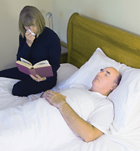
Catholic healthcare providers are important players in the increasingly integrated U.S. healthcare system, but now church leaders are considering more stringent guidelinesfor these partnerships. The United States Conference of Catholic Bishops this week is considering whether to tighten directives on what end-of-life care and other services can be offered by non-Catholic providers that partner with those that have church affiliation.
At issue is the document “Forming New Partnerships with Health Care Organizations and Providers,” which last was updated in 2001. The bishops are debating whether to revise this to be more in line with Vatican guidance received last February. The changes likely would make it more difficult for Catholic providers to take part in healthcare networks that offer certain reproductive and end-of-life services, ProPublica reported Tuesday.
Some of the issues have been playing out in Washington state, which according to ProPublica has seen the most religious-secular healthcare partnerships in recent years. Catholic health systems have pressured doctors with admitting privileges to stop helping patients end their lives, despite the state’s “death with dignity” law, according to the non-profit investigative journalism organization.
The potential revisions could have far-reaching implications, given that Catholic providers have grown substantially in recent years. If the bishops agree to revise the partnership rules at this week’s General Assembly in Baltimore, the group’s Committee on Doctrine will create a draft for consideration at a later meeting, according to a press release.




